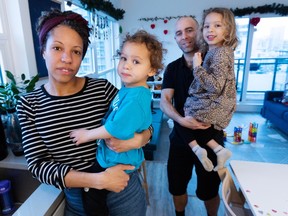Metro Vancouver residents hoped the budget would bring relief for housing, child care, family doctors, transportation, new schools and financial subsidies

Article content
Eligible families will soon pocket an average of $445 more a year with expansions to the B.C. family benefit and will save about $100 annually off their electricity bills. They are two of the promises in the provincial budget designed to make life more affordable for struggling households.
But those programs will only last for a year, a time period that includes this fall’s provincial election.
Advertisement 2
Article content
Article content
When asked whether parents will be disappointed when this extra money is clawed back in 2025, Finance Minister Katrine Conroy responded: “I think families will be very grateful to get the boost this year.”
She added there are other supports for families in the budget, too, such as help for new homebuyers and increased funding to support children with autism and dyslexia.
“When you add them all up, the goal is to support people,” Conroy said.

Single parent Crystal Howard receives the family benefit and welcomes the extra cash, but is critical that both it and the electricity relief are just for one year and are relatively small amounts.
“What is the long-term goal of helping families in poverty or single parents, if it is only going to be granted for a year? It’s not like the inflation rate in Vancouver is all of a sudden going to decrease and everything is going to be affordable,” said Howard, a mother of two from Vancouver who defines herself as “working poor.”
Starting July 1, there will be a 25 per cent increase to the B.C. family benefit, with eligible households receiving an average of $445 more over the next 12 months. Single parents will receive, on average, $232 more a month.
Article content
Advertisement 3
Article content
How much families will pocket depends on their makeup. For example, two parents with two children will get an average of $147 more a month, but payments will drop to zero for households with income above $162,000. For the one-year period only, the income cutoff has also been raised by 25 per cent, which should expand by 66,000 the number of families eligible to collect the benefit.
Also for only one year, all households, regardless of income, will save an average of $100 a year on their electricity bills.

Single mother Sayeeda Noorani will gladly accept the extra money, but says it isn’t enough to help already struggling families get ahead and is upset that both measures will end after a year.
“I don’t think it will make a dent in housing and grocery costs. I just think there is more they can do,” she said.
Affordable housing is a huge priority for many families, and the budget made some new promises.
First-time buyers will be partly or fully exempt from paying property transfer taxes on homes valued up to $860,00, which is higher than the previous ceiling of $500,000. This could help an extra 14,5000 people in B.C., twice as many as before.
Advertisement 4
Article content
Michael Lumberjack, a father of four and a renter in Surrey, had hoped the budget would contain solutions to help his middle-income family buy a home. But, he said, the new $860,000 ceiling is not high enough to assist his family.
“It does help a specific demographic, if I was looking at a one-bedroom house or a two-bedroom house. But it doesn’t help myself, when I will need a four-bedroom house.”
The budget also introduced a new flipping tax, meant to lower home prices by reducing speculative buyers, which Lumberjack said will likely have long-term benefits but won’t aid people like him hoping to buy in the short-term. “I feel like that isn’t going to change anything immediately.”
There were no new promises for renters in the budget, including no movement in the income threshold for people eligible for the renters’ rebate, which disappointed Noorani.
The mother of three from Burnaby, who works as a school supervision aid and a before- and after-school care provider, said rent eats the largest chunk of her $40,000 annual income, leaving little money for other expenses.
Advertisement 5
Article content
One of the B.C. NDP’s marquee policies has been expanding affordable child care, but this budget contained no new announcements to accelerate building more centres or creating more $10-a-day spots beyond those previously announced.
That was not the news Brittany Hopkins wanted to hear. She and her husband, Mike Fogel, have been unable to find daycare for their two young children since moving to Vancouver two years ago.
“It doesn’t feel like they are treating it like an urgent problem,” she said.
Hopkins’ family lives in Olympic Village, where there is no school, despite the Vancouver school board indicating since 2006 that one is needed and the premier indicating last April there was “an urgency” to build one.
When asked by reporters why this school was not included in the budget, Conroy said there would be “an announcement in the coming weeks,” but did not elaborate.
“It would be nice to see them coming through on that promise. It’s really hard to continue being hopeful, when they keep saying, ‘Just wait, just wait, hold on,’” said Hopkins, whose five-year-old daughter Naomi will attend kindergarten this September in a school far from their neighbourhood.
Advertisement 6
Article content
Recommended from Editorial
-

Vaughn Palmer: B.C. Budget 2024 bleeds red ink, with no cure in sight
-

B.C. Budget 2024: Money to address climate emergencies mere ‘lip service,’ critics say
-
![The provincial multiplex legislation applies only to areas currently restricted to single-family and duplex housing. Vancouver earlier introduced its own multiplex policy, writes Alex Hemingway.
(NICK PROCAYLO/PNG)
00067138A [PNG Merlin Archive]](https://smartcdn.gprod.postmedia.digital/vancouversun/wp-content/uploads/2024/02/png0405ncityplan-09.jpg?h=96&strip=all&quality=80&sig=zCKUdsN8fwguM-tB6b0Iow)
B.C. Budget 2024: ‘Flipping’ tax to hit profits on quick sales of residential properties
-

Flipping tax to cash for families: 7 ways the 2024 B.C. budget could affect you
The budget also did not pledge any new money to build more new schools in Surrey, where classrooms are overflowing into hundreds of portables. That seems like an error to Lumberjack, who has three children in the Surrey school district.
“I do see the demographic on that side of the Fraser as being the most expanding population, and it would be a huge mistake if they don’t at least initiate some plans to expand how many schools they need,” said Lumberjack, a training and employment coach with Access Trades, a non-profit that works with urban Indigenous people.
The only new school announced for the 2024-25 year was the seismic replacement of a middle school in Victoria.

Although the B.C. NDP has increased pay for family doctors to address the massive shortage in this province, there are still many people without one. The budget contained no new steps to try to fix this problem, which frustrated Noorani who hasn’t had a doctor for five years.
Advertisement 7
Article content
“It’s horrible to have to go to a clinic and get different doctors all the time,” she said.
There was also no new spending announcements to house homeless people. “They are not tackling the root causes of poverty. It’s just piecemeal,” said Noorani, a member of the non-profit group the Centre for Family Equity.
The budget promised new funding of $30 million for literacy screening for children with dyslexia and other learning disabilities, as well as $28 million more to support youth with autism.
lculbert@postmedia.com
Bookmark our website and support our journalism: Don’t miss the news you need to know — add VancouverSun.com and TheProvince.com to your bookmarks and sign up for our newsletters here.
You can also support our journalism by becoming a digital subscriber: For just $14 a month, you can get unlimited access to The Vancouver Sun, The Province, National Post and 13 other Canadian news sites. Support us by subscribing today: The Vancouver Sun | The Province.
Article content





















Discussion about this post